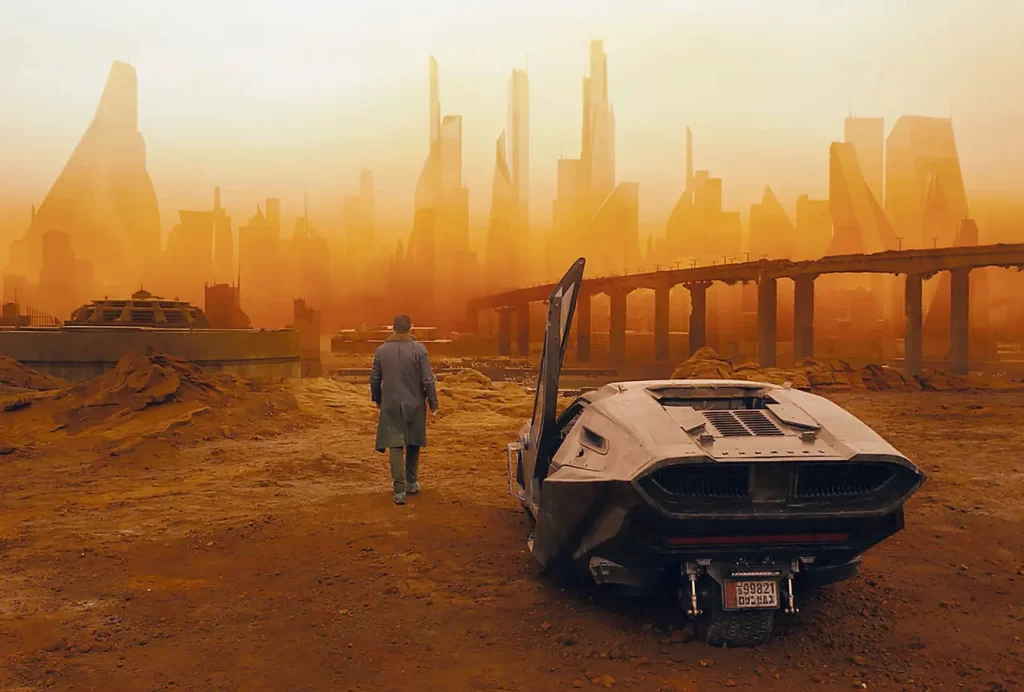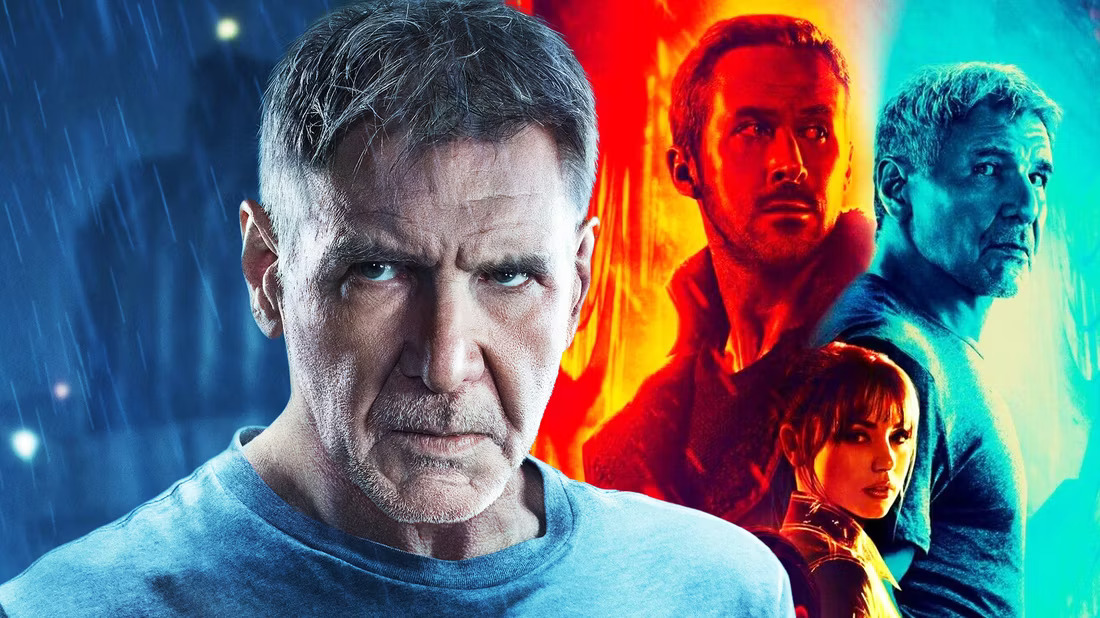Thirty years after Ridley Scott’s groundbreaking Blade Runner, Denis Villeneuve took on the daunting task of crafting a sequel. Blade Runner 2049, released in 2017, not only lived up to the legacy of its predecessor but also carved its own distinct path, exploring deeper into the philosophical and existential questions at the heart of the cyberpunk genre.
The film follows K (Ryan Gosling), a new blade runner tasked with “retiring” rogue replicants. During a routine mission, he uncovers a secret that threatens to destabilize the already fragile society, leading him on a quest for the truth and a potential revolution.
Screenplay and Story Structure: A Labyrinth of Mystery and Morality
Hampton Fancher, co-writer of the original Blade Runner, returns to pen the screenplay alongside Michael Green. The script masterfully weaves a complex narrative, slowly unraveling the mystery while simultaneously delving into the ethical implications of artificial intelligence and what it means to be human. The story structure, much like the sprawling cityscape it inhabits, is labyrinthine yet purposeful, leading the audience through a series of twists and turns that keep them engaged and guessing until the very end.
Directing: Villeneuve’s Visionary World-Building
Denis Villeneuve, known for his atmospheric and visually stunning films like Arrival and Sicario, brings his signature style to Blade Runner 2049. His direction is meticulous, creating a world that feels both familiar and utterly alien. He uses long takes and deliberate pacing to immerse the audience in the decaying grandeur of future Los Angeles, a world choked by pollution and illuminated by holographic advertisements. Villeneuve’s mastery of visual storytelling allows the film to speak volumes even in its quieter moments.
Acting Performances: A Stellar Ensemble Bringing Humanity to Artificiality
Ryan Gosling delivers a nuanced and compelling performance as K, a replicant grappling with his own existence. His portrayal of K’s internal struggle is subtle yet powerful, conveying a depth of emotion that resonates with the audience. Harrison Ford reprises his role as Rick Deckard, adding gravitas and a sense of continuity to the narrative. The supporting cast, including Ana de Armas as Joi, Sylvia Hoeks as Luv, and Jared Leto as Niander Wallace, are equally impressive, each bringing a unique dimension to their respective roles. De Armas, in particular, shines as Joi, a holographic companion who yearns for connection and meaning, blurring the lines between artificiality and genuine emotion.
Cinematography: A Visual Symphony of Light and Shadow
Roger Deakins, one of the most celebrated cinematographers of our time, lends his masterful eye to Blade Runner 2049. The film is a visual feast, with stunningly composed shots that capture the desolate beauty of the dystopian landscape. Deakins’ use of light and shadow is particularly noteworthy, creating a sense of depth and atmosphere that draws the viewer into the film’s world. The iconic neon-drenched cityscapes are breathtaking, paying homage to the original while pushing the boundaries of visual storytelling. The mise-en-scène is meticulously crafted, with every detail contributing to the overall atmosphere and narrative.

Score and Sound Design: A Sonic Tapestry of Unease and Wonder
The score, composed by Hans Zimmer and Benjamin Wallfisch, is a haunting and evocative blend of electronic and orchestral elements. It perfectly complements the film’s atmosphere, creating a sense of unease and wonder that lingers long after the credits roll. The sound design is equally impressive, immersing the audience in the cacophony of the futuristic city while also highlighting the subtle sounds of the environment, adding to the film’s realism and emotional impact.
Themes and Symbolism: Exploring the Nature of Humanity and Existence
Blade Runner 2049 delves into complex themes of identity, memory, and the nature of humanity. The film questions what it means to be human in a world where artificial beings are virtually indistinguishable from their creators. Symbolism is woven throughout the narrative, from the recurring motif of eyes to the decaying urban landscape, each element contributing to the film’s exploration of existential questions. The film also touches upon themes of environmental degradation and the dangers of unchecked technological advancement, reflecting contemporary concerns about the future of our own world.
Comparisons: A Worthy Successor to a Sci-Fi Classic
While Blade Runner 2049 is undeniably a sequel, it stands on its own merits as a powerful and thought-provoking film. It expands upon the themes and ideas of the original while also forging its own unique identity. Comparisons to other neo-noir and cyberpunk films like Akira and Ghost in the Shell are inevitable, but Blade Runner 2049 distinguishes itself through its philosophical depth and stunning visual execution. It also echoes Villeneuve’s own filmography, showcasing his penchant for complex narratives and visually arresting worlds.
Cultural Impact and Relevance: A Timely Exploration of Artificial Intelligence
In an era of rapid advancements in artificial intelligence, Blade Runner 2049 feels particularly relevant. The film’s exploration of the ethical implications of AI and its potential impact on society sparks important conversations about the future of technology and its role in shaping our world. It also serves as a cautionary tale about the dangers of dehumanization and the importance of empathy in a rapidly changing world. The film’s enduring popularity and critical acclaim solidify its place as a modern sci-fi classic, prompting ongoing discussions about its themes and interpretations.
Overall Assessment: A Masterpiece of Modern Science Fiction
Blade Runner 2049 is a visually stunning, intellectually stimulating, and emotionally resonant film that transcends the genre of science fiction. It is a worthy successor to the original, expanding upon its legacy while carving its own distinct path. The film’s masterful direction, compelling performances, and thought-provoking themes make it a must-see for fans of science fiction and anyone interested in exploring the complex questions of what it means to be human in a technologically advanced world. This is a film that stays with you long after the credits roll, prompting reflection and discussion about the nature of our own existence and the future we are creating. I give Blade Runner 2049 a resounding 5 out of 5 stars. It is a cinematic achievement that deserves to be seen and appreciated for its artistry and its insightful commentary on the human condition. You can learn more about the film on its IMDb page.
“`



